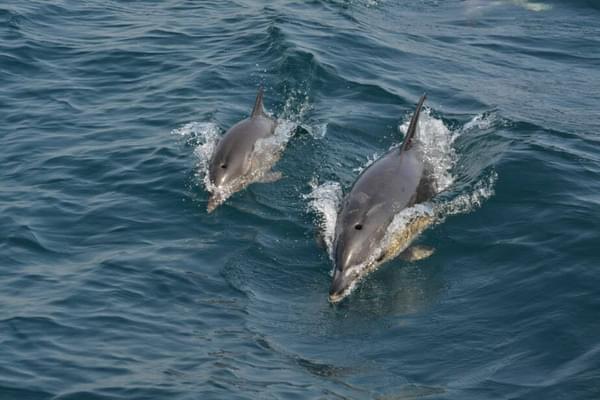It was only last week that we wrote about fishing communities actively supporting efforts to protect dolphins. So we didn't expect to be writing about it again quite so soon, let alone on our doorstep.
It was a welcome surprise to learn that France has, this week, imposed a temporary month-long ban on fishing in the Bay of Biscay in a welcome effort to protect the area's dolphin population. The ban started on Monday 22 January and will last until 20 February, grounding all fishing vessels longer than eight metres (26.2ft); an estimated 450 French boats, making up 70% of the industry in the area. Equally surprising is that some members of the fishing community are enthusiastically supporting the ban.
Incredibly, this marks the first fishing ban in the Bay of Biscay since the end of World War II and will cover the entire area of the Atlantic coastline, from Brittany to the Spanish border. The ban has been implemented following a surge in dolphin deaths resulting from fishing bycatch.
As many as 9000 dolphins die each year in the Bay alone as victims of bycatch, becoming incidentally caught and killed in fishing gear such as nets, ropes and lines.
Although the ban is only four weeks long, it will vastly improve the survival rate of marine animals and in particular the common and striped dolphins that can be found in the Bay. The International Whaling Commision (IWC) explains that globally, bycatch causes devastating effects on marine life with smaller animals dying immediately, unable to reach the surface to breathe, and can cause larger ones to tow heavy ropes, buoys or nets for weeks, months or in some cases years before their deaths.
Marine experts at CIEM (a scientific body that tracks North Atlantic ecosystems) have been recommending a winter-ban such as this for a few years now, and it has been met with fierce resistance from the French fishing community in the area. The French government has promised at least 75% compensation for fishermen for their loss of income in the next four weeks, but many in the community do not believe this is enough.
However, those in favour of the ban have been talking it up as a positive move, arguing that it will benefit fishermen. Phillipe Garcia from the Défense des Milieux Aquatiques (DMA) observed that it is “counter-productive” for fishermen to oppose the ban as continually high death rates among dolphins simply further the case for stricter action against fishing. The fishing industry in France has a strong voice and never shies away from saying what it thinks. Free money may be attractive in the short term but is unsustainable as a longer solution, and that is what is needed here more than anything.
For ORCA, the Bay of Biscay is where it all began and where the greatest amount of our survey effort and focus is still directed. Often, concerns around issues such as bycatch are met with indifference, so we welcome this action. Having established a principle that action is necessary, it remains to be seen what subsequent practice looks like.

Tens of thousands of cetaceans are entangled in fishing gear every year and injured or killed, decimating vulnerable populations and pushing some species towards the brink of extinction. Our monitoring work plays a vital part in helping to identify hotspots where cetaceans are vulnerable to bycatch, so please visit www.orca.org.uk/donate to help support this vital work.

